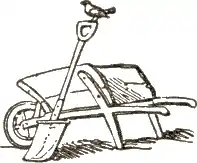Little Robin Redbreast
‘Little Robin Redbreast’ is an English language nursery rhyme, chiefly notable as evidence of the way traditional rhymes are changed and edited. It has a Roud Folk Song Index number of 20612.[1]
| "Little Robin Redbreast" | |
|---|---|
| Nursery rhyme | |
| Published | c. 1744 |
| Songwriter(s) | Unknown |

Lyrics
This rhyme is one of the most varied English nursery rhymes, probably because of its crude early version. Common modern versions include:
| Words | Fingerplay |
|---|---|
Little Robin Redbreast |
Right hand extended in shape of a bird |
- Little Robin Redbreast
- Came to visit me;
- This is what he whistled,
- Thank you for my tea.[2]
and:
- Little Robin Redbreast
- Sat upon a tree,
- Up went the Pussy-Cat,
- And down went he;
- Down came Pussy-Cat,
- Away Robin ran,
- Says little Robin Redbreast—
- Catch me if you can.
- Little Robin Redbreast jumped upon a wall,
- Pussy-Cat jumped after him, and almost got a fall.
- Little Robin chirped and sung, and what did pussy say?
- Pussy-Cat said Mew, mew mew,—and Robin jumped away.[3]
Origins
The earliest versions of this rhyme reveal a more basic humour. The earliest recorded is from Tommy Thumb's Pretty Song Book (c. 1744), which has the lyric:
- Little Robin Red breast,
- Sitting on a pole,
- Nidde, Noddle, Went his head.
- And poop[4] went his Hole.[2]
By the late eighteenth century the last line was being rendered 'And wag went his tail,' and other variations were used in nineteenth-century children's books, in one of the clearest cases of bowdlerisation in nursery rhymes.[2]
Fingerplay
The rhyme has been used as a fingerplay. A version from 1920 included instructions with the lyrics:
- Little Robin Redbreast
- Sat upon a rail,
- (Right hand extended in shape of a bird is poised on extended forefinger of left hand.)
- Niddle noddle went his head,
- And waggle went his tail.
- (Little finger of right hand waggles from side to side.)[5]
Notes
- "Roud Folksong Index S303787 Little Robin Redbreast came to visit me". Vaughan Williams Memorial Library. English Folk Dance and Song Society. Retrieved 20 May 2016.
- I. Opie and P. Opie, The Oxford Dictionary of Nursery Rhymes (Oxford University Press, 1951, 2nd edn., 1997), pp. 371-2.
- Anon, The Only True Mother Goose Melodies (Munroe and Francis: Boston MA, 1833), p. 14.
- the meaning of this word subsequently changed, towards the start of the 20th century
- W. B. Forbush, H. T. Wade, W. J. Baltzell, R. Johnson, and D. E. Wheeler, ed., Boys and Girls Bookshelf; a Practical Plan of Character Building, Volume I (New York, NY: University Society, 1920), p. 10.